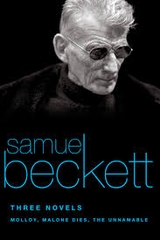'[Beckett] possesses fierce intellectual honesty, and his prose has a bare, involuted rhythm that is almost hypnotic.'
Few works of contemporary literature are so universally acclaimed as central to our understanding of the human experience as Nobel Prize winner Samuel Beckett’s famous trilogy. Molloy, the first of these masterpieces, appeared in French in 1951. It was followed seven months later by Malone Dies and two years later by The Unnamable. All three have been rendered into English by the author.
Molloy is Samuel Beckett's best-known novel, and his first published work to be written in French, ushering in a period of concentrated creativity in the late 1940s which included the companion novels Malone Dies and The Unnamable. The narrative of Molloy, old and ill, remembering and forgetting, scarcely human, begets a parallel tale of the spinsterish Moran, a private detective sent in search of him, whose own deterioration during the quest joins in with the catalogue of Molloy's woes. Molloy brings a world into existence with finicking certainties, at the tip of whoever is holding the pencil, and trades larger uncertainties with the reader.
Then I went back into the house and wrote, It is midnight. The rain is beating on the windows. It was not midnight. It was not raining.
'Malone', writes Malone, 'is what I am called now.' On his deathbed, and wiling away the time with stories, the octogenarian Malone's account of his condition is intermittent and contradictory, shifting with the vagaries of the passing days: without mellowness, without elegiacs; wittier, jauntier, and capable of wilder rages than Molloy.
The sound I liked best had nothing noble about it. It was the barking of the dogs, at night, in the clusters of hovels up in the hills, where the stone-cutters lived, like generations of stone-cutters before them. it came down to me where I lay, in the house in the plain, wild and soft, at the limit of earshot, soon weary. The dogs of the valley replied with their gross bay all fangs and jaws and foam...
The Unnamable - so named because he knows not who he may be - is from a nameless place. He speaks of previous selves ('all these Murphys, Molloys, and Malones...') as diversions from the need to stop speaking altogether. But, as with the other novels in the trilogy, the prose is full of marvellous precisions, full of its own reasons for keeping going.
...perhaps the words have carried me to the threshold of my story, before the door that opens on my story, that would surprise me, if it opens, it will be I, will be the silence, where I am, I don't know, I'll never know, in the silence you don't know, you must go on, I can't go on, I'll go on.
'More powerful and important than Godot... Mr. Beckett seeks to empty the novel of its usual recognizable objects–plot, situation, characters–and yet keep the reader interested and moved. Beckett is one of the most positive writers alice. Behind all his mournful blasphemies against man there is real love. And he is genuine: every sentence is written as if it had been lived." - The New York Times
'In the trilogy, Beckett is creating his own death in prose, quarrying right down to that subterranean country of his heart... What remains is a terminal vision, a terminal style and, from the point of view of possible development, a work at least as aesthetically terminal as Finnegans Wake.' - A. Alvarez


